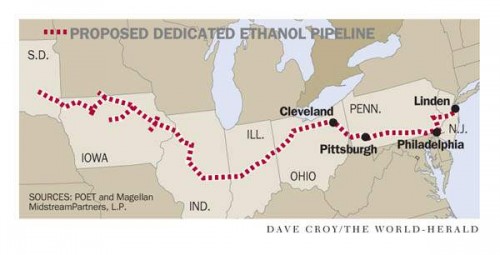Federal backing sought for midwest pipeline
Bipartisan bill introduced to fund massive $3.5 billion, 1,800-mile project.
 The proposed ethanol pipeline that will run from the Midwest to the East Coast will generate jobs while carrying as much as 3.6 billion gallons of ethanol a year. Speaking at a news conference along with Rep. Lee Terry, R-Neb., Rep. Leonard Boswell, D-Iowa, added that the pipeline project will boost the economies of states reliant on ethanol and help reduce the country's dependence on foreign oil.
The proposed ethanol pipeline that will run from the Midwest to the East Coast will generate jobs while carrying as much as 3.6 billion gallons of ethanol a year. Speaking at a news conference along with Rep. Lee Terry, R-Neb., Rep. Leonard Boswell, D-Iowa, added that the pipeline project will boost the economies of states reliant on ethanol and help reduce the country's dependence on foreign oil.
But their shared interest in ethanol brought them together Monday in Council Bluffs, where the congressmen touted a proposed pipeline that would send ethanol from the Midwest to markets in the East.
Terry, R-Neb., and Boswell, D-Iowa, recently introduced a bill that would provide federal loan guarantees for the massive $3.5 billion, 1,800-mile project guarantees that the project's backers say are critical to making it a reality.
Terry said the bill would extend to ethanol pipelines the same types of federal loan guarantees available to oil and gas pipeline projects.
"It's only fair,'' Terry said during a press conference with Boswell at Southwest Iowa Renewable Energy, a Bluffs ethanol producer.
Magellan Midstream Partners, a Tulsa, Okla., pipeline company, and Poet Ethanol Products, a major ethanol producer based in Sioux Falls, S.D., are working together on the proposed pipeline, which would extend from Mitchell, S.D., to shipping terminals in New York.
The pipeline would cross Iowa and include three tank farms in Iowa where Nebraska and Iowa ethanol producers could get product into the line, including one near Hartley in northwest Iowa.
It would be the first pipeline in the United States built exclusively for ethanol and has been touted as the world's longest ethanol pipeline. The 20-inch pipe could carry 3.6 billion gallons of ethanol per year.
Magellan spokesman Bruce Heine said the legislation pending in Congress is critical to the pipeline project getting into the ground.
Much of the market for ethanol is dependent on federal policy, including the federal renewable fuels standard requiring use of cleaner-burning fuels. Such policies are always subject to change.
Given that uncertainty, the loan guarantees are needed to give investors confidence and attract financing for the massive project. The federal guarantees would apply to 80 percent of the cost, Heine said, meaning significant risk capital still would need to be attracted for the project to go ahead.
Heine said if the loan guarantees can be secured, the partners would hope to complete the project by 2015.
Terry and Boswell said they hope to attach the pipeline provision to an energy bill in Congress later this year. Similar legislation is pending in the Senate.
Boswell said the pipeline would represent a significant cost benefit for ethanol producers, who currently ship their product by rail and truck.
Terry said that although those modes of transportation will remain critical for the industry, "we need an additional modality to get our ethanol to market.''
The congressmen also touted the jobs that would be created by boosting the region's growing ethanol industry.
"Nebraska and other Midwest states rely heavily on the ethanol industry," Terry said. "This legislation is critical to reducing our reliance on foreign oil by expanding the use of biofuels like ethanol. This is good, bipartisan legislation that will expand the use of ethanol nationwide and create much-needed jobs."
Source: www.omaha.com, By Henry J. Cordes
WORLD-HERALD STAFF WRITER
















